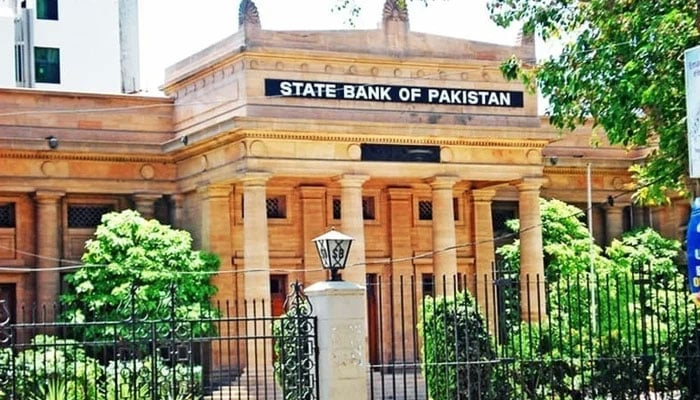Financial access?
The banking system’s flaws too need to be rectified to bring more people into the system
Access to financial services in Pakistan remains a privilege, with people employed in the formal sector mostly being some of the few who have access to various financial services available in the market. The governor of the State Bank of Pakistan (SBP) has however rightly pointed out that access to financial services is a fundamental right of citizens and that the SBP’s mission is to provide digital tools to citizens so that they can participate in the economy fully. But this mission requires passing certain obstacles if it were to become successful. In February 2023, a Karandaaz Financial Inclusion Survey disclosed a startling figure: 81 per cent of Pakistanis do not have bank accounts. This dismal figure is partly due to a lack of awareness among people regarding available financial services and partly due to their free will. Cash transactions in Pakistan are dominant, with most businesses applying a strict no-card policy.
The banking system’s flaws too need to be rectified to bring more people into the system. First, Pakistan has seen multiple cyber attacks where people have lost their savings to hackers. The long process of the reversal of money keeps more people away from dealing with banks. Second, some private banks sell savings schemes to people without disclosing complete information. Customers are lured into signing fixed deposit forms against good returns without them knowing that their money will be frozen for long periods. When people request to withdraw the amount early, they lose all the profit they had incurred in penalties and other charges. This makes more people opt for cash transactions.
The decade of the war on terror has badly impaired the country’s financial sector. The use of funds for terror financing has compelled Pakistan to impose additional layers of checks before allowing a person to set up his/her bank accounts. The verification process takes a lot of time, and many people eventually decide against maintaining a bank account. The transaction fee and other taxes that banks charge also make people turn to cash transactions. Not only does this deprive the government of the crucial tax revenue it needs to pay off debt, but also encourages the undocumented informal economy to thrive. Cash transactions also increase the security risk, compelling businesses to take breaks during operation hours to transfer cash to safe places. All this needs to change; the world is moving at a fast pace and technological advancements are all set to revolutionize the financial sector. Pakistan cannot afford to stay behind. Financial experts and government officials must convince more people to use digital financial services and carry out their day-to-day businesses efficiently. Credit scores of individuals will also allow them to use loan facilities offered by credible institutions instead of falling into the trap of loan sharks. Issues that have long discouraged people from entering the formal sector of the economy must be investigated so that people can fully take advantage of innovation in fintech and become active contributors to the economy.
-
 Gabourey Sidibe Gets Candid About Balancing Motherhood And Career
Gabourey Sidibe Gets Candid About Balancing Motherhood And Career -
 Katherine Schwarzenegger Shares Sweet Detail From Early Romance Days With Chris Pratt
Katherine Schwarzenegger Shares Sweet Detail From Early Romance Days With Chris Pratt -
 Jennifer Hudson Gets Candid About Kelly Clarkson Calling It Day From Her Show
Jennifer Hudson Gets Candid About Kelly Clarkson Calling It Day From Her Show -
 Princess Diana, Sarah Ferguson Intense Rivalry Laid Bare
Princess Diana, Sarah Ferguson Intense Rivalry Laid Bare -
 Shamed Andrew Was With Jeffrey Epstein Night Of Virginia Giuffre Assault
Shamed Andrew Was With Jeffrey Epstein Night Of Virginia Giuffre Assault -
 Shamed Andrew’s Finances Predicted As King ‘will Not Leave Him Alone’
Shamed Andrew’s Finances Predicted As King ‘will Not Leave Him Alone’ -
 Expert Reveals Sarah Ferguson’s Tendencies After Reckless Behavior Over Eugenie ‘comes Home To Roost’
Expert Reveals Sarah Ferguson’s Tendencies After Reckless Behavior Over Eugenie ‘comes Home To Roost’ -
 Bad Bunny Faces Major Rumour About Personal Life Ahead Of Super Bowl Performance
Bad Bunny Faces Major Rumour About Personal Life Ahead Of Super Bowl Performance -
 Sarah Ferguson’s Links To Jeffrey Epstein Get More Entangled As Expert Talks Of A Testimony Call
Sarah Ferguson’s Links To Jeffrey Epstein Get More Entangled As Expert Talks Of A Testimony Call -
 France Opens Probe Against Former Minister Lang After Epstein File Dump
France Opens Probe Against Former Minister Lang After Epstein File Dump -
 Last Part Of Lil Jon Statement On Son's Death Melts Hearts, Police Suggest Mental Health Issues
Last Part Of Lil Jon Statement On Son's Death Melts Hearts, Police Suggest Mental Health Issues -
 Leonardo DiCaprio's Girlfriend Vittoria Ceretti Given 'greatest Honor Of Her Life'
Leonardo DiCaprio's Girlfriend Vittoria Ceretti Given 'greatest Honor Of Her Life' -
 Beatrice, Eugenie’s Reaction Comes Out After Epstein Files Expose Their Personal Lives Even More
Beatrice, Eugenie’s Reaction Comes Out After Epstein Files Expose Their Personal Lives Even More -
 Will Smith Couldn't Make This Dog Part Of His Family: Here's Why
Will Smith Couldn't Make This Dog Part Of His Family: Here's Why -
 Kylie Jenner In Full Nesting Mode With Timothee Chalamet: ‘Pregnancy No Surprise Now’
Kylie Jenner In Full Nesting Mode With Timothee Chalamet: ‘Pregnancy No Surprise Now’ -
 Laura Dern Reflects On Being Rejected Due To Something She Can't Help
Laura Dern Reflects On Being Rejected Due To Something She Can't Help




